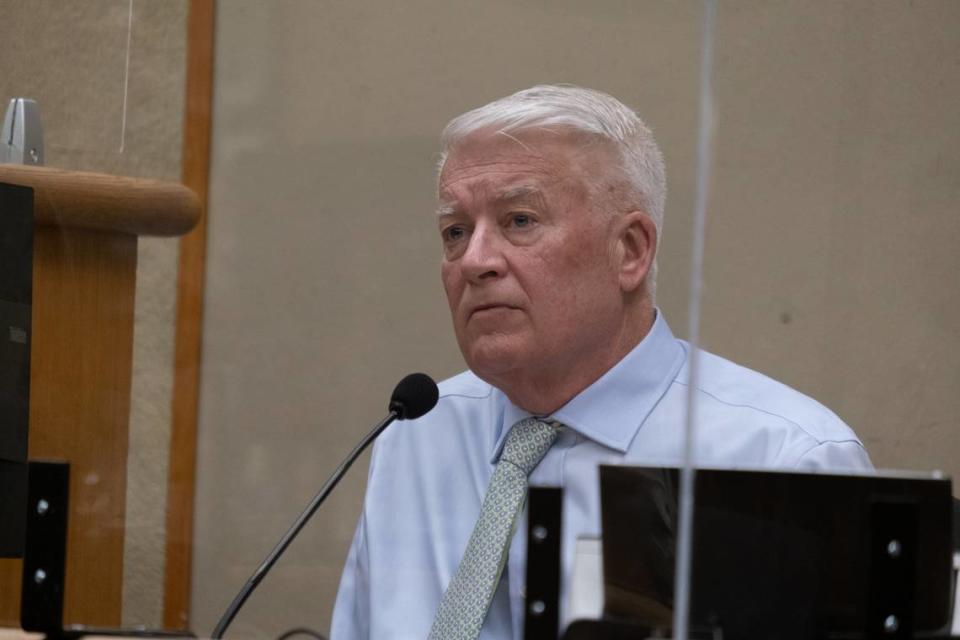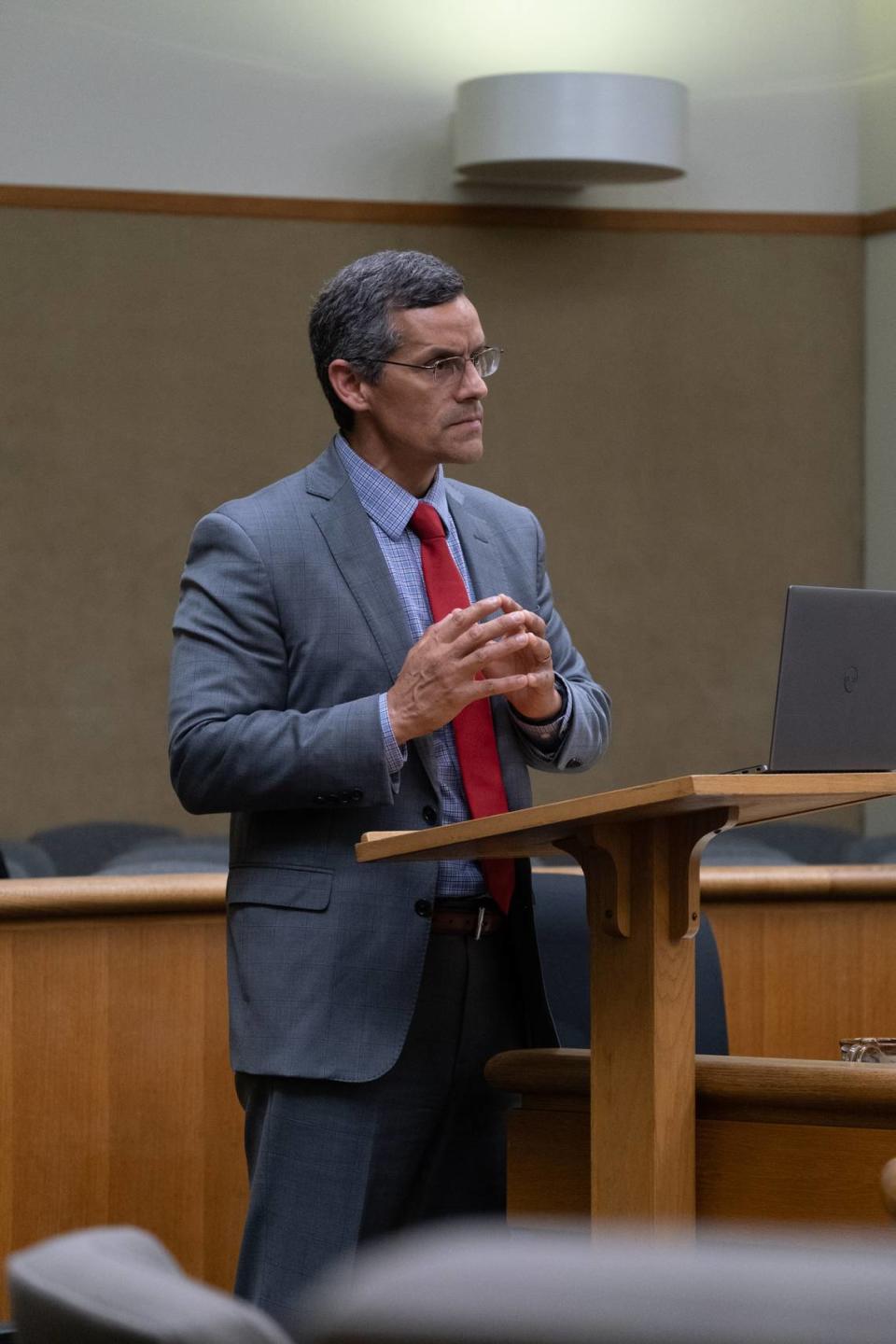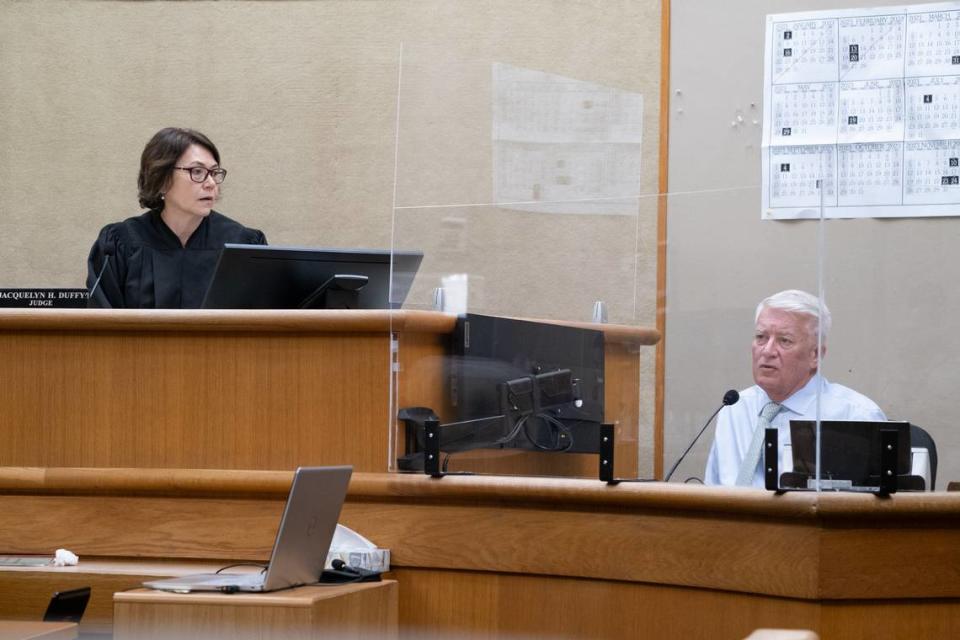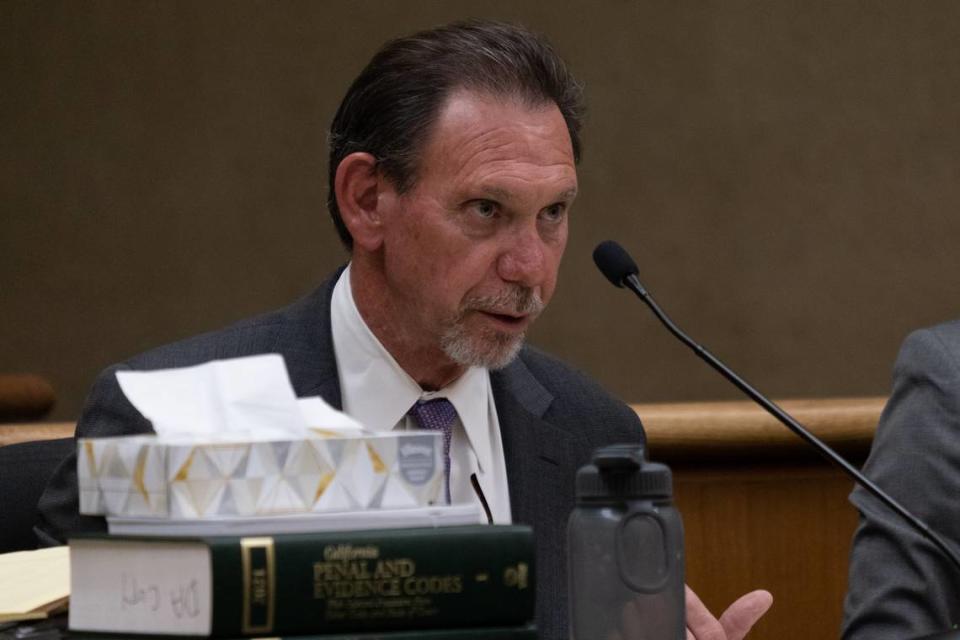Psychiatrist says man convicted of SLO County beach killings should be considered sane
A forensic psychologist who evaluated the man convicted of killing two people at a San Luis Obispo County beach after the crimes said the defendant had knowledge of guilt and wrongdoing.
As a result, he should be considered sane, the psychiatrict said.
Stephen Deflaun was found guilty of the first-degree murders of Stephen Wells, 37, and Wells’ 11-year-old nephew, Jerry Rios Jr., after a confrontation over a campsite at Morro Strand State Beach on July 8, 2001.
Deflaun was also convicted of assault with a firearm on a peace officer, in this case a California State Parks ranger.
The 63-year-old pleaded not guilty by reason of insanity in the case, so after the guilty verdict was reached last week, the trial moved into its second part — the so-called “sanity phase” — where San Luis Obispo Superior Court Judge Jacquelyn Duffy will decide whether Deflaun is legally insane, and therefore, not guilty of the crime by reason of insanity, despite the conviction.
According to court testimony throughout the trial, Deflaun has a long history of paranoid schizophrenia dating back to the early 1970s. A forensic psychologist in a 2004 court hearing said Deflaun would likely never be competent to stand trial, but that changed in April 2022.
Deflaun’s attorneys rested their case in the sanity phase Thursday, with a forensic psychologist and forensic psychiatrist testifying Deflaun could not distinguish right from wrong when he shot Wells and Rios Jr.
In order to be found not guilty by reason of insanity, the defense must prove beyond a reasonable doubt that Deflaun has a mental illness and either could not understand the nature and quality of his actions or could not reason right from wrong at the time of the shootings.

Psychiatrist opinion on shooter’s sanity unchanged after two decades
Forensic psychiatrist David Fennell continued his testimony Tuesday afternoon.
Fennell reviewed the case and evaluated Deflaun in the fall of 2001 at the direction of the San Luis Obispo County District Attorney’s Office in order to figure out whether Deflaun met the criteria for not guilty by reason of insanity.
Fennell’s opinion at the time of the crime was that Deflaun did know the nature and quality of his actions. He also found that Deflaun understood the wrongfulness of his actions, the psychiatrist said on the stand.
More than two decades later, his opinion remains unchanged.
Fennell said Deflaun’s knowledge of guns and how they work, along with Deflaun’s testimony on the stand, shows he did understand that shooting his gun aimed at someone’s head would likely result in death.
When it comes to whether Deflaun could reason through right or wrong, Fennell believes statements made by Deflaun and his behavior at the scene show he could understand the significance of what he was doing.
For example, Deflaun being focused only on Wells is not consistent with paranoid schizophrenic behavior because if someone is paranoid, they would be focusing on everyone around them.
Deflaun telling the kiosk employee “It’s over now” and saying “I’m sorry” to multiple first responders also indicates he recognized his wrongdoing, Fennell said.
Fennell said Deflaun’s statements would not be him speaking to his delusion of “the program,” because it didn’t make sense for him to apologize to a system he believed was only harming him.
According to court testimony, “the program” consists of voices in Deflaun’s head that tell him the world is against him, targeting and torturing him for the entertainment of others. Deflaun doesn’t want people to know he can hear “the program,” but at the same time believes everyone is a part of it and knows that he can hear it.
Fennell’s testimony was very similar to forensic psychologist Roxanne Rassti’s testimony Monday.

Psychiatrist: Alcohol factor in shooter’s loss of control
Fennell said Deflaun had different interactions with another camper before his confrontation with Wells. In the first situation, Deflaun thought the kiosk employee gave him the wrong campsite on purpose and became angered, but one of the campers showed him a map and directed Deflaun to the right site.
By the time he interacted with Wells a few hours later, however, Deflaun had drunk 12 Keystone beers.
The alcohol likely made Deflaun quicker to anger, more likely to act on it and lose control, Fennell said.
Fennell said there was “no doubt” Deflaun saw Wells as a real threat since he believed people were messing with him already.
The threat of Wells reporting him, taking his campsite and hassling him was compounded by the alcohol consumption, making the confrontation blow up beyond a verbal fight.
“Alcohol is like taking the brakes out of the car,” Fennell said.
Fennel also pointed to the 10-second pause between the first round of shots, where he shot Wells three times and Rios Jr. once, and the second rounds of shots, where he struck each with a final bullet.
That time gave Deflaun time to think and assess the situation, Fennell said, adding that a reasonable person would understand the people on the ground were not a threat to him.
Fennell said Deflaun not looking at Wells and Rios Jr. when he fired his second round of shots indicated that “maybe there’s a twinge of conscious there, maybe he couldn’t bring himself to look at the person he’s killing.”
It could also indicate Deflaun understood what he was doing was wrong, Fennell said.
Fennell added Deflaun’s statements and descriptions at the scene indicate he was acting and reacting in reality, despite having paranoid schizophrenia.
“What struck me was his accurate perceptions of reality,” Fennell said.

Psychiatrist didn’t use all of defendant’s statements to reach conclusion
Auditory hallucinations, like the voices in Deflaun’s head he calls “the program,” are typically associated with paranoid schizophrenia, which is what Deflaun has dealt with all his life, Fennell acknowledged.
It is typical for paranoid schizophrenia to not present itself obviously, Fennell said, because people with the illness often don’t want anyone to know.
So he said it isn’t surprising that Deflaun didn’t show his mental illness because of his paranoia, and he also agreed that delusions experienced by people with paranoid schizophrenia are usually illogical.
Fennell said it also isn’t surprising that someone with paranoid schizophrenia would obtain a firearm to protect themselves from the danger the voices in their head tell them is imminent.
Defense attorney Raymond Allen, however, noted that Deflaun owned his gun for more than a decade without incident before he killed Wells and Rios Jr.
Fennell said it does make sense that Deflaun would keep his gun loaded at all times because of his delusion about “the program.”

Allen pointed out that Deflaun testified the actuating event was that “the program” told him Wells was a “fed agen a--hole,” and not the confrontation with Wells itself.
Fennell said Deflaun’s last journal entry does corroborate that the voices contributed, but he believes Deflaun was still angry about the fight.
It didn’t make sense to Fennell that Deflaun would carry out the wishes of the voices in his head if he believed the voices to be evil, he said.
Fennell doubled down on Deflaun’s delusional framework not being logical between his actions of only targeting certain people while believing everyone is part of “the program.”
Schizophrenia may have contributed to the incidents, but Fennell said he does not think it meets the burden of legal insanity.
What’s next
No more witnesses will be called to the stand, but both parties agreed the judge will be allowed to consider the resume and report of one other prosecution-called doctor.
Closing arguments are scheduled for 10 a.m. Friday. After that, the judge will consider all of the evidence to decide whether Deflaun is legally insane.
If found not guilty by reason of insanity, Deflaun will be put in the custody of the California Department of State Hospitals for care and treatment unless or until his sanity is “recovered fully,” according to state penal code.
Deflaun will be sentenced according to California sentencing laws if the judge rules he was in his right mind when he killed Wells and Rios Jr.

